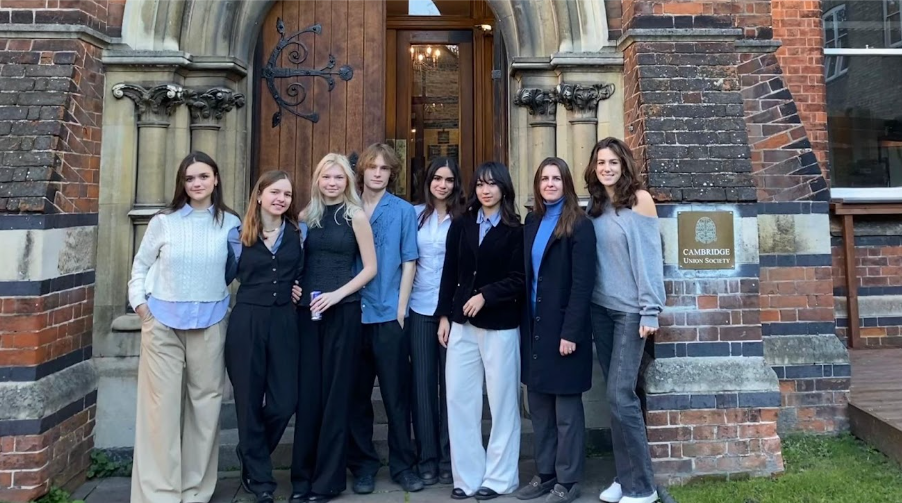Image Credit: Selma Lyhne
I rise on a point of information: did you know our own Sciences Po Union (SPU) competed in one of the most distinguished debate tournaments in the world just last month?
From November 16 to 17, the Cambridge Union Society, the oldest continuously running debating society in the world, held its annual ‘Cambridge IV’ (Cambridge Intervarsity) tournament, one of the most prestigious British Parliamentary debating competitions globally. Eight competitors from Sciences Po, including two executive team members and dedicated first-year and exchange students, participated in the tournament, eagerly awaiting fierce competition and razor-sharp rebuttals amongst the more than 260 participants present.
However, with over fifty universities from across the Atlantic and Asia attending – such as Yale, Brown, and Princeton, institutions like King’s College London (KCL), UCL, the University of Barcelona, and the International Islamic University Malaysia – how did SPU select among its own talents?
According to Selma Lyhne, President of Debate in SPU, the selection is made proportionally to the amount of time, effort, and commitment shown to the Union. Given that the association funds most of members’ participation through fundraising efforts, debaters seeking to join the tournament must show a high level of involvement. “This means people who’ve shown up every week, who join our beginner and competitive sessions to judge or observe, and who are really dedicated,” Lyhne said.
Beyond this, the SPU team also chooses the debaters based on how much they have improved, with Lyhne affirming, “we send the people who have never really been involved with the BP (British Parliamentary) structure before. Yet [they] used the resources I shared with them and were continuously involved each session…making us more comfortable and confident in sending them. We also wanted to reward their hard work.” From this, Sciences Po’s delegation was created and was composed of three debating teams (two people each) and two judges.
Alyssa Ungureanu, a first-year executive entrant, seconded this, stating, “Experience is definitely a plus, but I was able to go as a judge even though I don’t have experience in competitive debating…Come to the SPU training sessions and spars—that’s what helped me the most!”
As explained by Ungureanu, most of these beginners were sent as novice judges, since diving head-first into a rigorous spar is “quite intimidating…when you first start out, and you can also learn a lot from judging.”
Additionally, as explained by Lyhne, 2As in the executive team were“valued and prioritized the most, as they have remained in the Union the longest and done the most amount of behind-the-scenes work”. This mix of students is also appreciated, remarking,“it’s quite nice to get people to interact a little bit more within Sciences Po.”
The First-Day Rundown
Debate kicked off bright and early Saturday morning, with four rounds of debating interspersed with meals and a few socializing breaks stretching from 8:30am to nearly 9pm. Following the BP format, each round, lasting a couple of hours, contained four teams of two where delegates argued about motions released 15 minutes before the beginning. Participants delivered seven-minute speeches before being ranked by a panel consisting of a trainee judge and chair.
The socializing element, however, was a bit lacking. According to Ungureanu,
“It’s one of the aspects that I think was a little underdeveloped, as the entire day was dedicated to debating and running from one room to the next. In the evening, there was some time allocated to socializing in the Union’s bar, but people tended to stick to people they knew.”
However, she felt that the memorability of the motions proposed during the high-paced debates made up for this, with executive baby Patriks Zilins stating, “I remember one of the motions was about legalizing paternity tests in France. The debate was pretty intense, but it was also oddly funny seeing the debaters so passionate about it.”
Success On The Horizon?
The final preliminary round took place Sunday morning, with the highest-ranking teams “breaking” into the final elimination stages. While SPU’s team didn’t advance to these final phases, the delegation had spirited interactions with the sixteen progressing universities and supported them until the final moments.
Finally, Oxford emerged triumphant in the Grand Final, winning against students from LSE and Dartmouth. Within the ESL (English Second Language) Final, KCL came out on top, beating Durham, the University of Barcelona, and Edinburgh.
Beyond The Podium
From discussing the collegiate university model to Bangladesh’s Awami League, Cambridge IV is an opportunity for players to put their weekly practice into action and be confronted with fresh perspectives on topics they would not typically face in their day-to-day lives. Regardless of any results, this also acted as a chance to meet debaters from all over the world. As mentioned by Zilins, “It was really fun to debate against people from not just Europe, but the whole world. I think that high quality tournaments like Cambridge IV help you learn a lot of new stuff about the world.”
To anyone thinking of joining with little experience, do not fear! As shared by first-year judge Daphné Philipp, “even though I was less experienced than the rest of the panel, I was encouraged to speak and share my ideas and I felt comfortable participating in the deliberation.”
Even members with previous BP experience can benefit, with executive baby Karlīna Jansone sharing, “while it was definitely scary, I do think I learned a lot more about the [subjects of the] debates themselves because of the packed tournament schedule…which certainly helped me advance my personal stress management skills […] To anyone else interested in improving their argumentation and public speaking, I just could not recommend debate competitions enough!”
Oxford, LSE, and What The Future Has In Store
However, Cambridge is not the only competition SPU participated in. In the past two weeks, SPU competed in LSE IV, held by the LSE Student Union Debate Society in London between November 2 to 3, and Oxford IV, taking place in Oxford between November 9 and 10. Both tournaments had a similar debate structure and are equally prestigious.
As the Union looks to the next few months, its participants are faced with a variety of options, with spars occurring across European cities such as Copenhagen and Vienna, as well as Sciences Po’s own hosting of ‘Champagne IV’ mid-second semester.
Overall, as outlined by Lyhne, “going to debate tournaments abroad is a unique and great way to improve your debating skills very fast, learn from brilliant people, put what we learn at Sciences Po into practice, and meet a global debate community that we’re quite isolated from in our day to day which, all in all, provides a perfect mix of travel, social interaction and getting to know your team better while also doing something that is academically and mentally stimulating.”
Other posts that may interest you:
Discover more from The Sundial Press
Subscribe to get the latest posts sent to your email.





